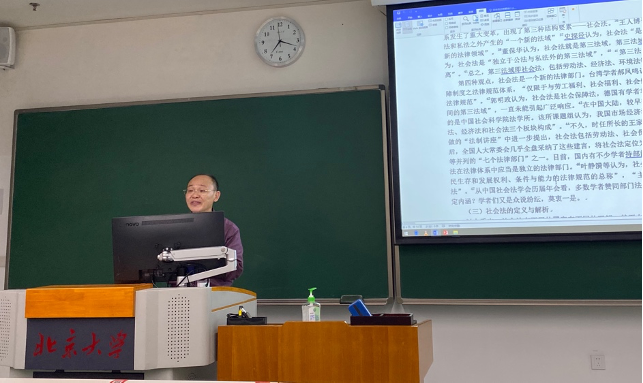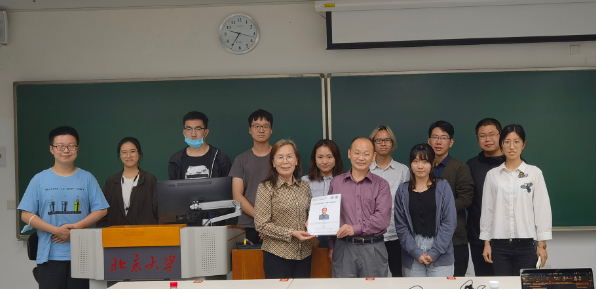Peking University Social Law Forum "The Definition, Character and Legal Positioning of Social Law" was successfully held
Date:2021-09-22
From 18:40-21:30 on September 20, the 67th session of the Peking University Social Law Forum hosted by the PKU Institute of Labor Law and Social Security Law was successfully held. This lecture was presided over by Professor Ye Jingyi, Director of the Institute of Labor Law and Social Security Law of Peking University, and lectured by Yu Shaoxiang, the chief researcher of the "Innovative Project" of the Institute of Social Development Strategy of the Chinese Academy of Social Sciences.

Yu Shaoxiang first sorted out the concept of social law and the different opinions on the definition of social law, and introduced to the students the consensus of social law in Germany, France, Britain, the United States, and Japan. In addition, he also introduced the domestic theoretical disputes on the definition of social law and summarized them into four mainstream views: the first view is that social law cannot be clearly defined and is just a legal philosophy or cultural concept; the second view is that social law can be divided into broad, middle, narrow and other different levels; the third view is that social law is equivalent to the third law domain; the fourth view is that social law is a new and complete legal department with specific connotations. Yu Shaoxiang evaluated the above viewpoints. He pointed out: First of all, social legislation is a world trend, and there should be a clear understanding of what social law is, the connotation and extension of the concept of social law can be defined. Second, the concept of law must not be ambiguous. It is necessary to use the concept of social law in a definite sense. Therefore, it is not feasible to classify and define social law. Third, although the "law domain theory" has certain values, it also has obvious flaws. Social law is one of the legal departments of the third law domain. It is a misunderstanding to equate social law with the third law domain. Fourth, the understanding of social law shouldn’t limit to its text meaning. It cannot be considered that all laws related to society or social issues are social laws, and the content of social laws is not static. Based on the above considerations, Yu Shaoxiang went on to put forward the basic definition of social law, that is, “the general definition of laws and regulations formulated and promulgated by the state to protect the safety of the weak in society, provide social welfare, and promote people’s livelihood and welfare".
In the section "The Character of Social Law", Yu Shaoxiang elaborated and analyzed the legal character of social law. He summarized the nature of social law into three aspects: First, social law is a new legal system that compensates for the inadequacy of private law in solving social problems. It is a correction and prevention of the negative consequences of market competition or certain processes. Second, social law regulates social relations that are equal in form but unequal in substance. To a certain extent, it can be called "social correction law." It is realizing corrective justice rather than natural justice. With regard to issues such as the polarization between the rich and the poor, social law rectifies and repairs unbalanced social relationships through the implementation of special or inclined protections for the weak, so that society tends to be substantially equal and fair. Third, social law is a distribution law other than market distribution. It aims to solve social distribution problems in production relations other than market distribution. The content of social distribution adjustments includes wealth and rights, and the form of adjustment includes both secondary allocation and three allocations also include the initial allocation.
In addition, Yu Shaoxiang also put forward his own views on the legal positioning of social law. He pointed out that positioning social law as a law domain is a major theoretical deviation in the study of social law, and is the result of a misunderstanding of Jürgen Habermas's "public domain" theory. Finally, he further clarified the departmental law positioning character of social law, that is, social law is a legal department in the third law domain.
Finally, Prof. Ye Jingyi commented on this lecture. She thanked Yu Shaoxiang for sharing the research experience and the latest research results of the basic theories of social law based on his academic experience, and pointed out that the basic research of social law is rich in content. She believes that the research on the concept, character and legal positioning of social law is of great significance, and hopes that the students will learn Yu Shaoxiang's spirit of studying with great concentration and maintain the original intention of a social law researcher and learner.

Translated by: Zhang Dayuan



